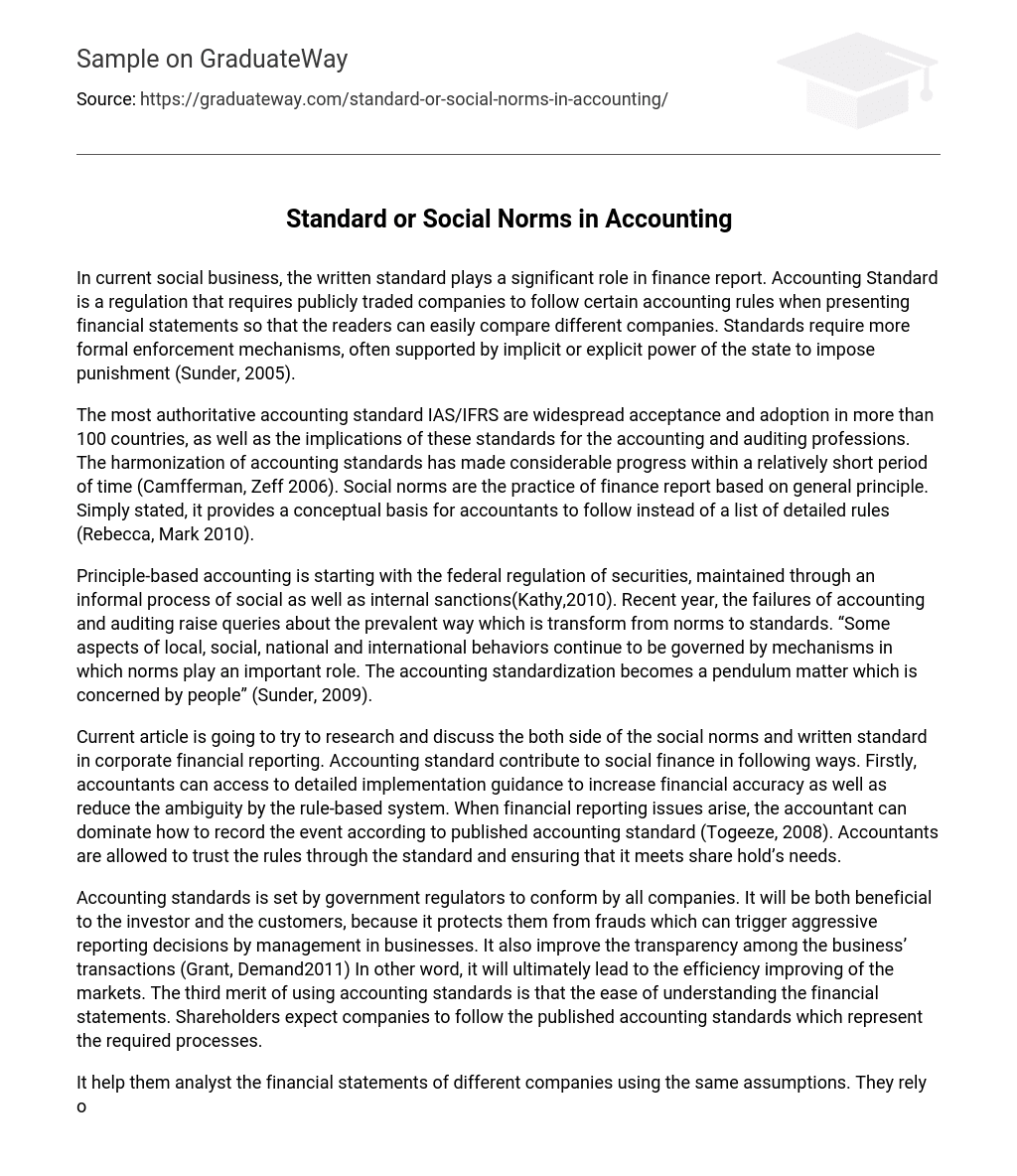In current social business, the written standard plays a significant role in finance report. Accounting Standard is a regulation that requires publicly traded companies to follow certain accounting rules when presenting financial statements so that the readers can easily compare different companies. Standards require more formal enforcement mechanisms, often supported by implicit or explicit power of the state to impose punishment (Sunder, 2005).
The most authoritative accounting standard IAS/IFRS are widespread acceptance and adoption in more than 100 countries, as well as the implications of these standards for the accounting and auditing professions. The harmonization of accounting standards has made considerable progress within a relatively short period of time (Camfferman, Zeff 2006). Social norms are the practice of finance report based on general principle. Simply stated, it provides a conceptual basis for accountants to follow instead of a list of detailed rules (Rebecca, Mark 2010).
Principle-based accounting is starting with the federal regulation of securities, maintained through an informal process of social as well as internal sanctions(Kathy,2010). Recent year, the failures of accounting and auditing raise queries about the prevalent way which is transform from norms to standards. “Some aspects of local, social, national and international behaviors continue to be governed by mechanisms in which norms play an important role. The accounting standardization becomes a pendulum matter which is concerned by people” (Sunder, 2009).
Current article is going to try to research and discuss the both side of the social norms and written standard in corporate financial reporting. Accounting standard contribute to social finance in following ways. Firstly, accountants can access to detailed implementation guidance to increase financial accuracy as well as reduce the ambiguity by the rule-based system. When financial reporting issues arise, the accountant can dominate how to record the event according to published accounting standard (Togeeze, 2008). Accountants are allowed to trust the rules through the standard and ensuring that it meets share hold’s needs.
Accounting standards is set by government regulators to conform by all companies. It will be both beneficial to the investor and the customers, because it protects them from frauds which can trigger aggressive reporting decisions by management in businesses. It also improve the transparency among the business’ transactions (Grant, Demand2011) In other word, it will ultimately lead to the efficiency improving of the markets. The third merit of using accounting standards is that the ease of understanding the financial statements. Shareholders expect companies to follow the published accounting standards which represent the required processes.
It help them analyst the financial statements of different companies using the same assumptions. They rely on the assumptions in the accounting standards when interpreting the results reported. Shareholder can utilized this assumption and knowledge when reading any financial statement. The rule-based system also exist some drawbacks. Accounting standards request accountants comply with the inflexible framework. However, each company faces different experiences. The accountants have to fit their unique experiences into the guidelines of the standard regulation.
This will made financial process longer and more complex. Secondly, using accounting standards will cost much for the company to comply with the standard. The complex of rules will cause unnecessary complexity when preparing financial statements. “In many cases, companies have to consider new procedures requiring a large investment cost that includes employee labor costs, system upgrades and employee training” ( Grant, Demand 2011) Social norms system relies on general guidelines for accounting. The primary advantage of principles-based accounting is its broad guidelines that can be applied to various circumstances.
For the financial world are complex and the companies operate in different financial circumstances, it becomes increasingly complicated to fit into standardized rules for the whole economy. By the flexibility method in social norms, companies are allowed to prepare their financial statements using the most efficient way to accurate disclosure of their current situation. The strict format of accounting standard made disclosure more complicate and less informative at the sometime. “For example, a company would not have the ability to list industry specific data in the manner it thought best.
The principles-based method gives this flexibility” ( Cubixilbes ,2011) However, the flexibility method in principle-based system creates its own set of issues. For each company record its assumption in financial statement in its own manner, accounting statements will vary in style. It will make more difficult to compare companies. Companies are more likely to make a reporting mistake which can result in legal problem, particularly across different industries. The system has created an industry of financial transactions designed to circumvent the rules.
Many believe that rules closing structuring loopholes will only result in more elaborate ways to evade them. ” (Salvador carmona , 2008) In conclusion, both accounting social norms and written standard have merits and disadvantages when they are used in the recording assumption in the financial statements. Rule-based accounting help accountants and shareholder work in a same framework, but it will cost much for complying with the standard. Principle-based accounting is beneficial for various circumstances. However, it will cause different statement styles and more likely to make some mistakes.





